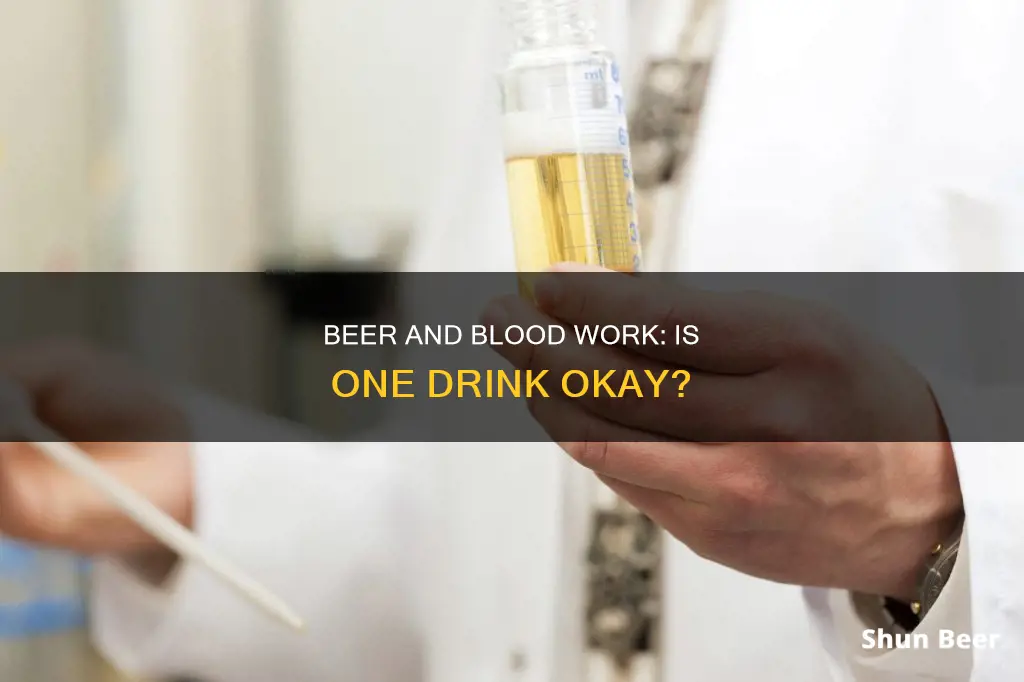
It is generally recommended to avoid drinking alcohol before a blood test, as it can affect the accuracy of the results. Alcohol can interfere with several types of blood tests, including blood sugar, liver function, coagulation, and electrolyte tests. It can also affect the body's ability to control fluid status, which can impact kidney function tests. To ensure the most accurate results, it is advised to refrain from consuming alcohol for at least 24 hours before the test. However, if you have consumed a small amount of alcohol within this timeframe, it is important to discuss this with your healthcare provider, who can provide personalized guidance.
| Characteristics | Values |
|---|---|
| Alcohol consumption before a blood test | Alcohol can interfere with the accuracy of certain blood tests by affecting the levels of certain substances in the blood. |
| How alcohol affects blood tests | Alcohol can affect glucose levels, liver enzyme levels, the clotting ability of the blood, and the pH balance of the blood. |
| Should alcohol be avoided before a blood test? | It is generally recommended to avoid alcohol for at least 24 hours before a blood test to ensure accurate results. However, this may depend on the specific test and the amount of alcohol consumed. |
| Moderate alcohol consumption | For moderate drinkers, it is generally okay to have one drink (for women) or up to two drinks (for men) the night before the test, as long as these limits are not exceeded. |
| Heavy alcohol consumption | Heavy drinkers should be honest with their healthcare provider about their alcohol consumption. The provider may recommend abstaining from alcohol for a certain period before the test. |
| Blood tests that may be affected by alcohol consumption | Lipid panel blood test, liver function test, fasting blood glucose test, coagulation test, electrolyte test |
What You'll Learn
- Alcohol can affect the accuracy of blood tests by impacting glucose levels
- Drinking can alter enzyme activity and fat metabolism in the liver
- Alcohol can affect the clotting ability of the blood
- It is recommended to avoid alcohol for at least 24 hours before a blood test
- Consult a doctor if you have consumed alcohol before a blood test

Alcohol can affect the accuracy of blood tests by impacting glucose levels
Drinking alcohol can affect the accuracy of blood test results by impacting glucose levels. This is because the liver, which is responsible for stabilising glucose levels, prioritises metabolising alcohol over maintaining blood glucose levels. As a result, alcohol consumption can lead to hypoglycaemia or low blood glucose levels.
The liver stabilises glucose levels by storing carbohydrates and releasing them into the bloodstream between meals and overnight. However, when alcohol is present in the body, the liver will focus on metabolising the alcohol instead of its usual function of maintaining blood glucose levels. This can lead to a drop in blood glucose levels, which can be dangerous for people with diabetes or other blood sugar issues.
It is important to note that the effects of alcohol on blood glucose levels can vary depending on the amount consumed and individual health factors. Generally, moderate drinking, defined as one drink per day for women and up to two drinks per day for men, may improve blood glucose management and insulin sensitivity. On the other hand, excessive drinking (more than three drinks daily) can lead to higher blood glucose levels.
Additionally, alcohol can interfere with diabetes medications, particularly insulin and sulfonylureas, further increasing the risk of hypoglycaemia. Therefore, it is recommended that people with diabetes consult their doctors about their drinking habits and follow specific guidelines for alcohol consumption.
To ensure accurate blood test results, it is generally advised to avoid drinking alcohol the day before the test. This is because alcohol can remain in the bloodstream for several hours, and its presence can interfere with the accuracy of certain tests. By abstaining from alcohol and following the doctor's instructions, individuals can help ensure the reliability and accuracy of their blood test results.
Beer and Coke: A Match Made in Heaven?
You may want to see also

Drinking can alter enzyme activity and fat metabolism in the liver
Drinking alcohol can affect the results of blood tests, including liver function tests. While a single beer the day before your blood work may not significantly impact the results, it's important to follow any specific instructions provided by your doctor.
Drinking alcohol can alter enzyme activity and fat metabolism in the liver, leading to changes in liver function. Alcohol is primarily metabolized by the liver, and this process can influence various enzymatic activities. One of the key enzymes involved in alcohol metabolism is alcohol dehydrogenase (ADH), which is found predominantly in the liver. ADH oxidizes alcohol, resulting in the production of acetaldehyde and NADH, a reduced form of nicotinamide adenine dinucleotide (NAD+). This reaction plays a crucial role in the alteration of enzyme activity in the liver.
The oxidation of alcohol by ADH affects the NAD+/NADH ratio within liver cells, particularly in the cytosol and mitochondria. This altered redox state can impact other metabolic pathways that rely on NAD+ or are inhibited by NADH. For example, the reduced NAD+/NADH ratio can influence the citric acid cycle, pyruvate dehydrogenase, and fatty acid oxidation.
Additionally, the metabolism of alcohol generates acetyl-CoA, which is a key metabolite produced from the breakdown of carbohydrates, fats, and excess proteins. Acetyl-CoA can be further converted into CO2, fatty acids, ketone bodies, cholesterol, and steroids. This interconnected metabolism between alcohol and other nutrients can disrupt normal fat metabolism in the liver.
Moreover, alcohol consumption can lead to the formation of fatty acid ethyl esters through the reaction between ethanol and fatty acids. These esters are synthesized in the liver and can inhibit DNA and protein synthesis, contributing to alterations in liver function.
In summary, drinking alcohol can alter enzyme activity and fat metabolism in the liver by influencing the activity of key enzymes, disrupting the NAD+/NADH ratio, and impacting the production of metabolites involved in fat metabolism. These changes can have both immediate and long-term effects on liver function, which is why it is often recommended to avoid alcohol consumption before blood work, especially when liver-related tests are involved.
Drinking Beer in Space: What's the Deal?
You may want to see also

Alcohol can affect the clotting ability of the blood
Drinking alcohol can affect the natural ability of your blood to form clots. This effect is due to alcohol's impact on two key aspects of the clotting process: platelet function and clotting factors.
Firstly, alcohol reduces the number of platelets in the blood. Platelets are blood cells that play a crucial role in forming blood clots. When you experience an injury, platelets rush to the site and clump together to create a plug that stops bleeding. Alcohol interferes with the production of these cells in the bone marrow, leading to a decrease in their overall count.
Secondly, alcohol affects the stickiness of platelets. Platelets are naturally sticky, which allows them to adhere to each other and form a stable clot. However, alcohol consumption makes these cells less sticky, hindering their ability to aggregate and plug injuries effectively.
Additionally, alcohol interferes with the release of clotting factors, which are proteins that further stabilize blood clots. By disrupting the normal release of these proteins, alcohol weakens the clotting process.
The impact of alcohol on blood clotting can have both positive and negative consequences. On the one hand, the blood-thinning effect of alcohol may lower your risk of experiencing strokes caused by blockages in blood vessels. On the other hand, excessive alcohol consumption, particularly in quantities exceeding the recommended guidelines, can increase your risk of bleeding strokes. This heightened risk may be due to the combined effects of reduced platelet count, impaired platelet function, and altered clotting factor release.
It is important to note that the effects of alcohol on blood clotting can vary depending on the quantity and type of alcoholic beverage consumed, as well as individual factors such as genetics. Therefore, further studies are needed to fully elucidate the complex relationship between alcohol intake and blood coagulation.
Beer for Slugs: Does It Work?
You may want to see also

It is recommended to avoid alcohol for at least 24 hours before a blood test
It is generally recommended to abstain from alcohol for at least 24 hours before a blood test. Alcohol can affect the accuracy of specific blood tests by altering the levels of certain substances in the blood, such as glucose levels, enzyme levels in the liver, and electrolyte levels. These alterations can impact the results of blood sugar tests, liver function tests, and coagulation tests.
The effects of alcohol consumption on the body include disrupting the balance of glucose regulation and impairing the liver's ability to produce glucose, which may lead to hypoglycemia. Alcohol can also alter enzyme activity and fat metabolism in the liver, affecting various blood test components and leading to inaccurate readings, especially in tests that rely on liver function markers and lipid levels.
It is important to note that a standard blood test can detect alcohol up to 12 hours after consumption. However, the body may need up to 25 hours to fully metabolize and clear a moderate amount of alcohol from the system. Therefore, it is advisable to refrain from consuming alcohol for at least 24 hours before a blood test to ensure the most accurate results.
If you are concerned about the impact of a small amount of alcohol consumed within the past 24 hours on your blood test results, it is recommended to discuss this with your healthcare provider. They can provide personalized guidance and advise on the best course of action based on the specific test and the amount of alcohol consumed.
Additionally, if you are a heavy drinker, it is crucial to be honest with your healthcare provider about your alcohol consumption. They may recommend abstaining from alcohol for an extended period before the blood test to ensure accurate results. Heavy alcohol consumption can also lead to serious health problems, including liver damage and an increased risk of certain cancers, so it is important to seek help to reduce your alcohol intake.
Mixing Beer and Cough Syrup: What You Should Know
You may want to see also

Consult a doctor if you have consumed alcohol before a blood test
Alcohol can stay in your bloodstream for up to 12 hours, and even then, the tiniest amounts can be traced in your bloodstream several days after consumption. If you have consumed alcohol before a blood test, it is important to consult your doctor.
Your doctor will be able to advise you on the best course of action, depending on the type of blood test you are taking. For example, if you are taking a liver function test, your doctor may advise you to reschedule the test, as alcohol can cause irregular enzyme levels, which might interfere with the blood examination.
If you are taking a blood cholesterol test, your doctor may advise you to proceed with the test, as alcohol does not affect the levels of fats in the blood. However, it is important to note that alcohol can affect your blood sugar levels and fat levels, so if you are taking a blood test to check for diabetes, for example, alcohol consumption may affect your results.
It is always best to check with your doctor if you have consumed alcohol before a blood test. They will be able to advise you on the best course of action to ensure accurate test results.
Beer: A Carbohydrate Conundrum for Dieters?
You may want to see also







